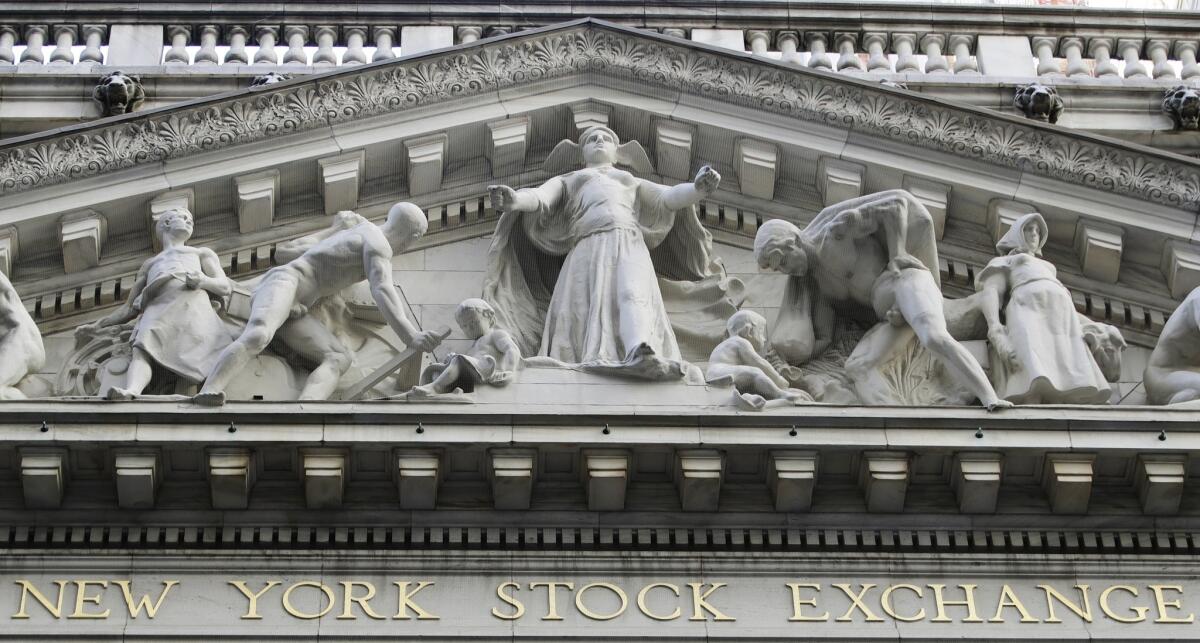Stocks set records and gold falls as fear recedes from markets

- Share via
Stocks around the world climbed Thursday, and U.S. indexes set records, as markets continued a rally sparked after the United States and Iran appeared to step away from the brink of war.
Money flowed into riskier investments, such as technology stocks, and trickled out of assets where investors traditionally hide money when they’re nervous, such as gold. A measure of fear in the stock market had its largest drop in a week.
Stocks have been rallying since Wednesday, after investors took comments from President Trump and Iranian officials to mean no military escalation was imminent in their tense conflict. It was a sharp turnaround from earlier days, when markets tumbled on the threat of war after the United States killed a top Iranian general in a drone strike.
The Standard & Poor’s 500 index rose 21.65 points, or 0.7%, to 3,274.70, breaking the record it set last week. The Dow Jones industrial average climbed 211.81 points, or 0.7%, to 28,956.90, and the Nasdaq composite rose 74.18 points, or 0.8%, to 9,203.43 — record highs for both of them.
Diminishing worries about a U.S.-Iran war put more of the market’s focus on the economy, corporate profits and other inputs that directly affect stock prices.
“The market is in pretty solid shape,” said Matt Hanna, portfolio manager at Summit Global Investments. “We could see some volatility in the beginning of 2020” following a well-worn path of choppy first halves for stocks during presidential election years, “but we don’t see any sort of recession on the horizon.”
Across markets, worries about a recession have faded since last year as central banks cut interest rates and pumped stimulus into the global economy. The United States and China also moved toward an interim deal in their trade war. China confirmed Thursday that its chief envoy in tariff talks with Washington would visit next week to sign their “Phase 1” trade deal.
The spotlight will move next to Friday’s labor report, which economists expect will show that employers added 160,000 jobs last month. They also forecast the unemployment rate to hold at its low level of 3.5%. The numbers are key because a strong job market has been propping up the economy and enabling U.S. households to continue to spend, even as manufacturing weakens due to tariffs and trade wars.
Technology stocks powered to the biggest gains in the S&P 500 and accounted for more than a third of the index’s gain. Apple’s 2.1% rise added momentum, and Advanced Micro Devices rose 2.4% — one of the larger gains in the S&P 500.
On the losing end were shares of several big retailers. Kohl’s fell 6.5%, the largest loss in the S&P 500, after it reported weaker sales during the 2019 holiday season than in the same period in 2018. Bed Bath & Beyond plunged 19.2% after it posted quarterly results that fell well short of analysts’ expectations.
The yield on the 10-year Treasury slipped to 1.86% from 1.87%.
Gold fell $5.70, to $1,551.70 an ounce, as investors felt less need for safety. It was the second drop in a row for the metal, following 10 straight days of gains.
In other commodities trading, benchmark U.S. crude slipped 5 cents to settle at $59.56 a barrel. Brent crude, the international standard, fell 7 cents to end at $65.37 a barrel. Wholesale gasoline was little changed at $1.65 a gallon. Heating oil fell 1 cent to $1.95 a gallon. Natural gas rose 3 cents to $2.17 per 1,000 cubic feet.
Silver fell 23 cents to $17.86 an ounce. Copper fell 1 cent to $2.81 a pound.
More to Read
Inside the business of entertainment
The Wide Shot brings you news, analysis and insights on everything from streaming wars to production — and what it all means for the future.
You may occasionally receive promotional content from the Los Angeles Times.










